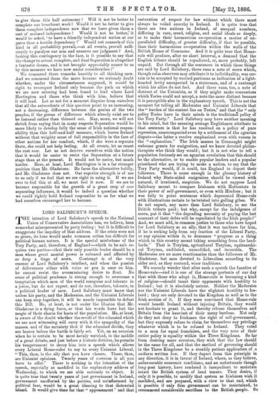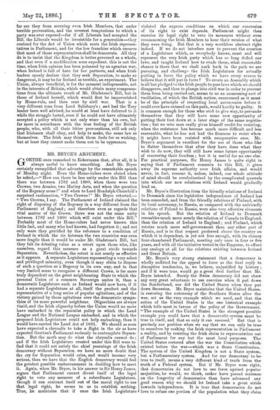LORD SALISBURY'S SPEECH.
THE intention of Lord Salisbury's speeeh to the National Union of Conservative Associations has, we believe, been somewhat misrepresented by party feeling but it is difficult to exaggerate the impolicy of that address. If the crisis were not so grave, its tone would make common action too difficult for political human nature. It is the special misfortune of the Tory Party, and, therefore, of England—which to be safe re- quires two partiea—that their only possible leader should be a man whose great mental power is coloured and affected by so deep a tinge of scorn. Contempt is of the very essence of Lord Salisbury's intellect, and when the passion of deliverance either with voice or pen is once on him, he cannot resist the overmastering desire to flout. No sense of political prudence is, strong enough to overcome a temptation which men of the world recognise and tolerate in a jester, but do not expect, and do not, therefore, tolerate, in a political leader of men. Lord Salisbury must know that unless his party, and the Moderates, and the Unionist Liberals can keep step together, it will be nearly impossible to defeat this Bill. He, at least, is not under the illusion that Mr. Gladstone is a dying force, or that his weeds have lost the magic of their charm for hosts of the population. He, at least, is aware of the doubt whether the revolt of the educated which we are now witnessing will carry with it the sympathy of the masses, and of the certainty that if the educated divide, they are beaten before the battle is fairly set. Yet, on an occasion when he is certain to be most keealy watched, in the middle of a great debate, and just before a historic division, he permits his temperament to decoy him into a speech which allows every Liberal Home-ruler to say to every Unionist Liberal, "This, then, is the ally that you hare chosen. These, then, are Unionist opinions. Twenty years of coercion is all you have to offer." There is nothing in the intention of the speech, especially as modified in the explanatory addresa of Wednesday, to which we are able seriously to object. It is quite true that twenty years of just goverreneat in Ireland, government unaffected by the parkies, and uniafluenced by political fear, would be a great blessing to that distracted island. It would give time for that " appeasement" and that restoration of respect for law without which there must always be veiled anarchy in Ireland. It is quite true that there are two nations in Ireland, of unequal numbers, differing in race, creed, religion, and social ideals so deeply, as to make their harmonious co-operation a matter of un- paralleled difficulty, of greater difficulty, if that be possible, than their harmonious co-operation within the walls of the British House of Commons. And it is quite true that Home- rule will produce, after no short interval, a demand that the English tribute should be repudiated, or, more probably, left unpaid. But through all the sentences in which these things are said by Lord Salisbury, there runs a note of scorn which, though calm observers may attribute it to individuality, was cer- tain to be accepted by excited partisans as indication of a light- hearted levity unexpected in a statesman, and of a contempt which his allies do not feel. And there runs, too, a note of distrust of the Unionists, as if they might make concessions which Tories could not accept, a note the more distinct because it is perceptible also in the explanatory speech. This is not the moment for telling all Moderates and Unionist Liberals that the" burden of the contest lies on Tories," and that the "only policy Tories have in their minds is the traditional policy of the Tory Party." Lord Salisbury may have another meaning in his mind, but the meaning average Englishmen attribute to that sentence is that he has resolved on a policy of pure repression, unaccompanied even by a settlement of the agrarian dispute—the latter a resolve emphasised even with venom in the "explanation." The Irish masses in Connaught might welcome grants for emigration, and we know devoted philan- thropists who think they would ; but it is not wise to tell a population furiously set on agrarian revolution that this should be the alternative, or to enable popular leaders and a popular priesthood who are trying to make a nation, to say that the Tory Party would, if it could, tax England to deport their followers. There is cause enough in the gloomy history of Ireland why State-aided emigration should be viewed with natural, if irrational, suspicion. We do not suppose Lord Salisbury meant to compare Irishmen with Hottentots in their power of self-government, or even with Hindoos ; but it was folly to point sentences which deprecated Home-rule with illustrations certain to be twisted into galling gibes. We do not expect, any more than Lord Salisbury, to see the British tribute paid ; but why, except for the indulgence of scorn, put it that "the degrading necessity of paying the last remnant of their debts will be repudiated by the Irish people?" And, we must add, in common justice to those who have hoped for Lord Salisbury as an ally, that it was madness for him, if he is seeking help from any fraction of the Liberal Party, or any opinion within it, to denounce "progress as a thing which in this country meant taking something from the land- lords." That is Toryism, agricultural Toryism, squirearchi- cal Toryism, undiluted, unmodified, and incurable. The Moderates are no more reactionaries than the followers of Mr. Gladstone, but men devoted to Liberalism according to its older and, as they contend, wiser traditions.
We scarcely wonder that after such a speech the fanatics of Home-rule—and it is one of the strange portents of our day that with those who adopt it, Home-rule is becoming a kind of religion—should taunt their opponents with hostility to Ireland; but it is absolutely untrue. Neither the Moderates nor the Unionist Liberals have the slightest hostility to Ire- land ; they are only devoted to the Kingdom as well as to the Irish section of it. If they were convinced that Home-rule would benefit Ireland without injuring Britain, they would not hesitate to grant it, and thereby release themselves and Britain from the heaviest of their many burdens. Not only do they not deny to Irishmen the right of self-government, but they expressly refuse to claim for themselves any privilege whatever which is to be refused to Ireland. They voted to a man for equal franchises, and the very note of their entire policy is equality within the Three Kingdoms. So far from desiring mere coercion' they wish that the law should be the same for all, and that the method of governing should in the Three Kingdoms be a steadily patient application of a. uniform written law. If they depart from this principle in any direction, it is in favour of Ireland, where, as they believe, unEaveurable economic conditions, and an unfortunate though long past history, have rendered it inexpedient to maintain intact the British system of laud tenure. They desire, if only it is possible, to modify that syetena as Irishmen wish it modified, and are prepared, with a view to that end, which is possible if ,oaly firm government ,aan be maintained, to reoemmend -considerable sacrifmes to the British people. So
far are they from scorning even Irish Members, that under terrible provocation, and the severest temptations to which a party was ever exposed—for if all Liberals had accepted the Bill, the Liberals would be irresistible for a generation—they contend for the Act of Union which seats the Irish represen- tatives in Parliament, and for the low franchise which ensures that most of those representatives shall be democrats. All they do is to insist that the Kingdom is better governed as a whole, and that even if a modification were expedient, this is not the time, when Irish opinion has been poisoned by an agrarian war, when Ireland is full of hate for her partners, and when Irish leaders openly declare that they seek Separation, to make so dangerous, it may be for Ireland so terrible, an experiment. The Union, always beneficial, is for the moment indispensable, not in the interests of Britain, which would obtain many compensa- tions from the ultimate result of Mr. Gladstone's Bill, but in those of Ireland herself, which would first be impoverished by Home-rule, and then rent by civil war. That is a very different tone from Lord Salisbury's ; and had the Tory leader been well advised, he would at least have deferred to it while the struggle lasted, even if he could not have ultimately accepted a policy which is not only wiser than his own, but far more in accordance with the true feeling of the British people, who, with all their bitter provocations, still ask only that Irishmen shall obey, and help to make, the same law as themselves. The Irish may think them fools for so wishing, but at least they cannot make them out to be oppressors.



































 Previous page
Previous page